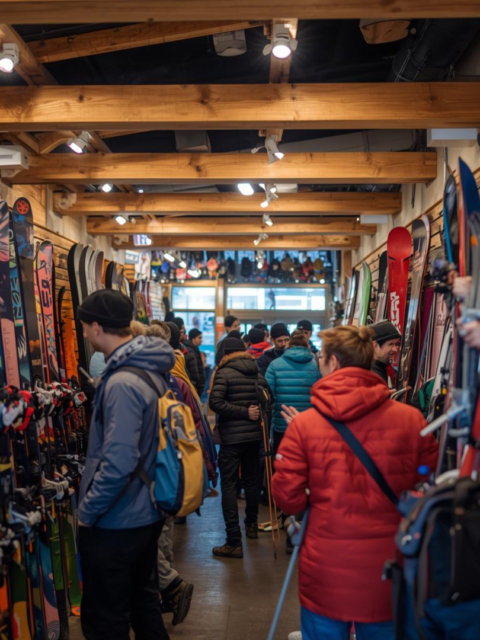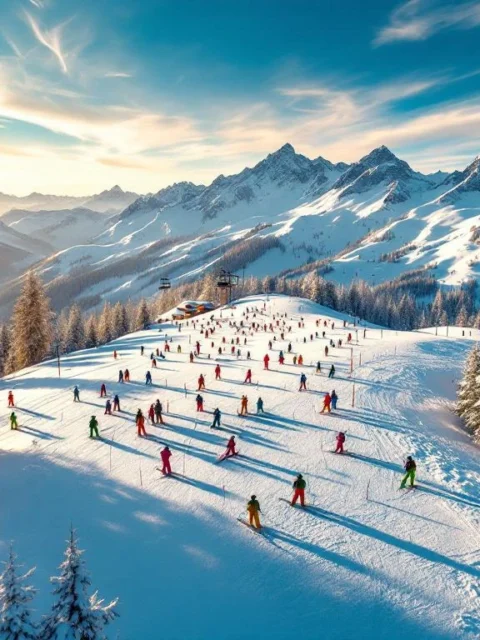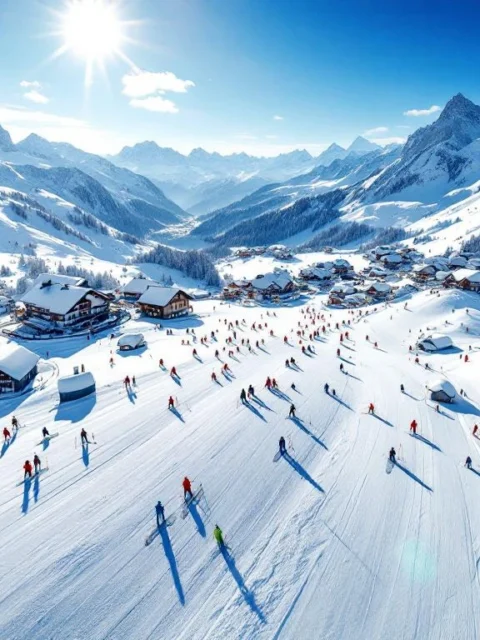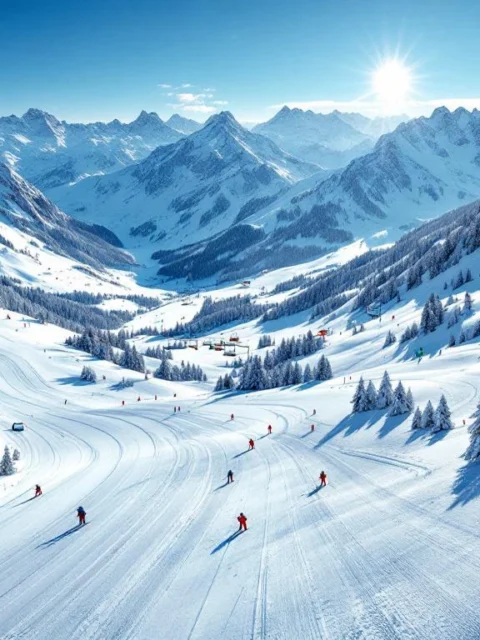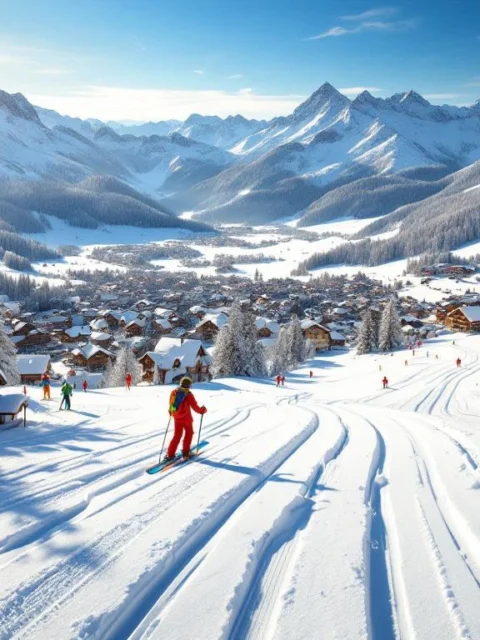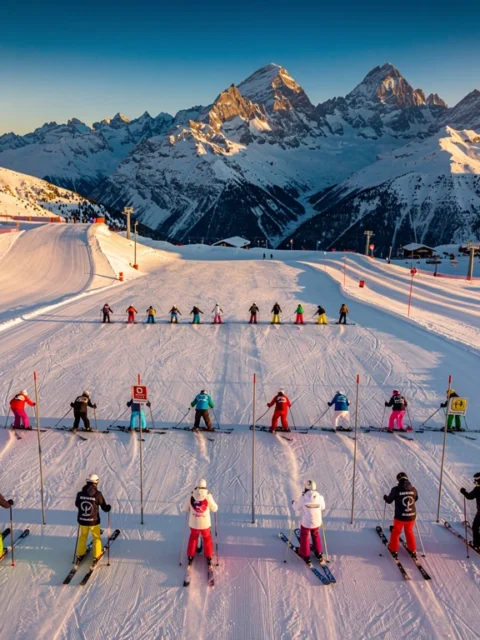How do you find ski lessons in your own language?

Going on a winter sports vacation is wonderful, but if you want to learn new ski techniques, the language barrier can be a significant challenge. Imagine: you’re standing on a snow-covered slope, ready to improve your skills, but the instructor only speaks fluent French or Italian. The essence of that perfect turn or that crucial safety tip? It gets completely lost in translation! For Dutch people wanting to ski in the Alps, finding ski lessons in your own language can make the difference between a frustrating experience and a winter vacation to remember forever. In this article, you’ll discover why native language lessons are so valuable, where to find Dutch-speaking instructors, and how to choose the perfect ski school for your language needs.
The Benefits of Ski Lessons in Your Native Language
If you’ve ever tried to learn a new skill in a foreign language, you know how confusing it can be. Skiing is no different. When you receive instruction in your own language, you immediately reap the benefits:
Faster Learning Process
When you receive instructions in your native language, you don’t have to translate what’s being said first. Your brain can focus entirely on the technique you need to learn. This direct processing of information ensures you pick up new ski techniques much faster. You don’t have to worry about what that one term meant again, but can immediately start perfecting your posture or movement.
Better Understanding of Technical Instructions
Skiing involves many technical terms and subtle cues that you can’t simply translate. When an instructor explains in English how to shift your weight for that perfect carving turn, you immediately understand what’s intended. This makes the difference between “roughly understanding what to do” and “knowing exactly what’s expected of you.”
Enhanced Safety Through Clear Communication
Safety on the slopes is no joke. Misunderstandings about safety instructions can lead to dangerous situations. An English-speaking ski instructor can clearly explain the risks, how to fall safely, and what to do in emergency situations. This creates a safer learning environment where you can confidently try new techniques.
Beyond these practical advantages, there’s also the comfort of being able to express yourself in your own language. You can easily ask questions, make jokes, and build a rapport with your instructor. This makes the entire experience not only more educational but also much more enjoyable!
English-Speaking Ski Areas in the Alps
The Alps are vast, and you won’t find English-speaking instructors equally easily everywhere. Fortunately, there are certain areas where you’re virtually guaranteed to find ski lessons in your mother tongue. These are the top destinations for English-language ski instruction:
Austria: A Haven for English-Speaking Skiers
Austria is known as the favorite ski country for many English speakers, and it shows! In popular areas like Gerlos, Saalbach-Hinterglemm, and Mayrhofen, you’ll always find English-speaking instructors. Especially in the Zillertal and Skicircus Saalbach, multiple ski schools offer English-language lessons. Even in smaller Austrian villages like Westendorf or Söll, you can often find lessons in your native language.
France: We Speak English Here Too
Although France might not be the first place you think of for English-language ski lessons, there are possibilities here as well. In Les Trois Vallées (with well-known places like Val Thorens and Méribel) and Portes du Soleil, many English-speaking instructors work. You might have to search a bit harder here, but they’re certainly available!
Switzerland: More Exclusive but Possible
In Swiss areas such as Davos-Klosters and Verbier, you can also find English-speaking ski instructors, though the options are more limited here. Often these are private instructors who speak several languages, including English. In larger resorts like Zermatt or St. Moritz, your chances of finding an instructor who speaks your language are greater.
You can easily compare ski lessons online in these areas and filter directly by language. This allows you to see at a glance which ski schools offer English instruction.
How to Identify Reliable Ski Schools with Language Options
Not all ski schools that claim to have English-speaking instructors offer the same quality. To ensure a good experience, it’s best to pay attention to these points:
Certifications and Professional Qualifications
Reliable ski schools only work with certified instructors. Look for ski schools whose teachers have international certifications such as ISIA (International Ski Instructors Association) or local qualifications like the Austrian Staatliche Skilehrerausbildung. A professional ski school is transparent about this and clearly lists their instructors’ qualifications on their website.
Reviews and Experiences from Other English Speakers
Reviews from fellow countrymen are invaluable! Look for reviews from other English-speaking skiers that specifically mention the language quality of the instructors. Pay particular attention to comments about how clear the explanation was and whether there was any miscommunication. Social media and forums such as Wintersporters.nl can be valuable sources of information.
Essential Questions to Ask Before Booking
Before confirming a ski lesson, it’s smart to ask these questions:
- Is the instructor a native English speaker or does he/she speak English as a second language?
- Can you guarantee that I’ll receive instruction in English? (Some schools promise this but can’t always deliver during peak season.)
- How much experience does the instructor have teaching in English?
- Can I meet the instructor beforehand?
Many ski schools now offer a chat or email service where you can ask these questions before booking. Use this to avoid surprises!
Private or Group Lessons: What Suits Your Language Needs?
Once you know where to find English-language ski lessons, the next question is: do you opt for private lessons or group lessons? Both options have advantages and disadvantages when it comes to language aspects.
Benefits of Private Lessons in Your Own Language
With private lessons, you get the instructor’s undivided attention. This means all explanations and feedback are completely tailored to you. For people who struggle with understanding technical instructions, even in their own language, this is ideal. The instructor can perfectly adapt their language level and word choice to your understanding.
Additionally, you can ask questions whenever you want without worrying about holding up the group. This is especially valuable for beginning skiers who have many questions or for advanced skiers who want to refine specific techniques and need detailed explanations.
When English-Language Group Lessons Are Preferable
Group lessons in English also have unique advantages. You learn not only from the instructor but also from the questions and experiences of other English-speaking skiers. This creates a friendly atmosphere where you learn together and motivate each other.
For children and teenagers, English-language group lessons are often ideal. They can make friends with other English-speaking children and feel more comfortable in an environment where their mother tongue is spoken. This ensures they can focus better on learning to ski rather than on understanding the instructions.
The Right Choice for Your Situation
If you’re unsure between private and group lessons, consider these factors:
- Your language level: even if you speak good English, if you struggle with understanding technical terms, private lessons might be better
- Your learning style: do you prefer learning in a social environment or do you prefer one-on-one attention?
- Your budget: group lessons are usually cheaper, but private lessons can be more effective in terms of learning time
- Your available time: with private lessons you often learn faster, which is convenient for a short stay
Some ski schools also offer a middle ground: semi-private lessons for small groups of friends or family. This combines the best of both worlds: personal attention in your own language and the fun of learning together.
Seasonal Availability
Note that the availability of English-speaking instructors can vary greatly by season. During English-speaking school holidays, the demand for native language lessons is highest, and it’s advisable to book well in advance. Outside these peak times, you often have more choice and sometimes even lower prices for the same quality instruction.
The costs for ski lessons vary greatly depending on the ski area, the type of lesson, and the duration. Generally, lessons in popular French and Swiss resorts are more expensive than in Austrian areas. Additionally, private lessons are always more expensive than group lessons, but this price difference can be shared if you go with family or friends.
If you’re looking for an English-speaking ski instructor, start your search early. With us, you can easily search, compare, and book with more than 250 ski schools in the Alps. We know the best places where you can learn to ski in your mother tongue and are happy to help you find the perfect match.
Whether you’re an absolute beginner or want to refine your technique, ski lessons in your own language make the difference between ‘roughly understanding what to do’ and ‘knowing exactly how to move.’ And you’ll feel that difference immediately on the slopes!
Frequently Asked Questions
What should I do if there's no English-speaking instructor available for my desired date?
First try to adjust your date if possible, especially outside of English-speaking school holidays. If that's not possible, ask about instructors who speak English as a second language, or consider bringing a bilingual friend to a regular lesson. You can also learn some important ski terms in the local language beforehand or use translation apps for crucial moments during the lesson.
How can I best prepare for my first English-language ski lesson?
Prepare some specific questions or learning goals you want to achieve. Share your skiing experience and any injuries or limitations with your instructor beforehand. Make sure you have the right equipment and clothing, and arrive on time so you don't start your lesson stressed. It can also be helpful to know some basic ski terms in advance, even in your own language, so you can follow instructions more quickly.
Is it more expensive to book an English-speaking ski instructor than a local instructor?
Generally, the basic rates are the same, regardless of the language the instructor speaks. However, some exclusive resorts may charge a premium for instructors who speak specific languages, especially during peak season. Therefore, always compare prices at different ski schools and explicitly ask if there are extra costs associated with an English-speaking instructor before booking.
What options are there for children who only speak English?
For children, there are special English-language ski kindergartens and children's groups in popular areas such as Gerlos and Saalbach. These offer not only ski lessons but a full day program in English. For teenagers, there are often 'English Teen Camps' during school holidays. Book these well in advance as they are popular. Alternatively, you can also opt for private lessons where the instructor can fully adapt to your child's language level.
How should I handle a situation where the assigned instructor turns out not to speak good English?
Address this directly during your first meeting with the instructor or after the first lesson. Contact the ski school's main office and explain your concern. Reliable ski schools will try to find an alternative instructor or offer an appropriate solution. Don't wait until the end of your vacation, as it will then be too late to adjust your lessons. Keep emails where language proficiency was promised as evidence.
Can I take preparatory ski lessons in English online before going to the Alps?
Yes, there are various online platforms where you can follow English-language video tutorials in preparation. Websites like SkiLessons.nl and YouTube channels of English-speaking ski instructors offer basic skills and terminology. This prior knowledge makes your physical lessons in the Alps more effective. Some ski schools even offer preparatory Zoom sessions with your assigned instructor, so you can get acquainted and discuss your learning goals in advance.
What is the difference between an English instructor and a local instructor who speaks English?
An English instructor has English as their mother tongue and understands cultural nuances and humor, which often makes the lessons more personal. A local instructor who speaks English may have more knowledge of the local ski area and conditions. Both can teach excellently in English, but native speakers can often convey more complex technical explanations more easily. Always ask about the instructor's language level and experience if this is important to you.


